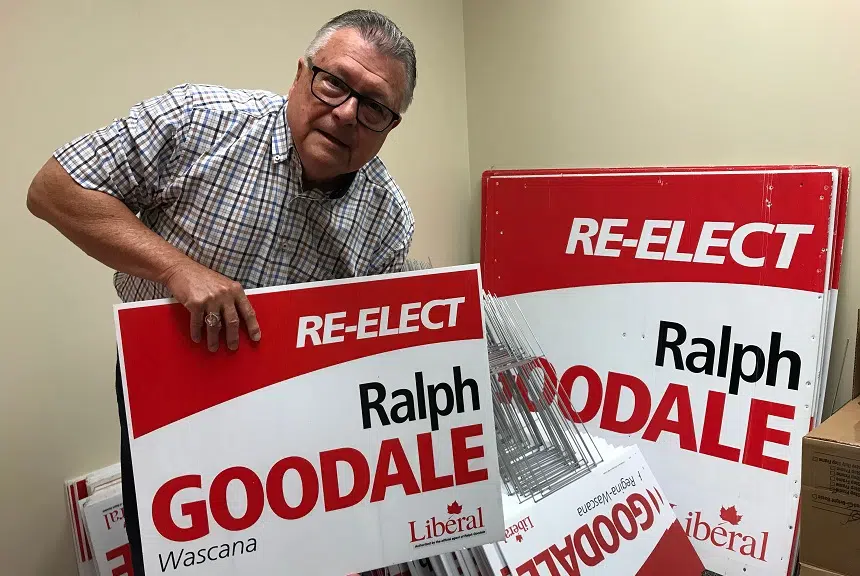The year Ralph Goodale mounted his first political campaign, Richard Nixon resigned from the presidency, The Guess Who was enjoying its sixth song to make it into the Billboard Hot 100 — Clap for the Wolfman — and this reporter was 26 years away from being born.
A lot of things have changed from Goodale’s first campaign in 1974 to his 15th campaign in 2019.
The first one Goodale brought up was the length of the campaign. Back then, the minimum length for a campaign was 60 days. Now, the legal maximum length a campaign can be is 50 days.
Goodale said things took longer to do back then.
“Back in 1974, you literally had enumerators going house to house, farm to farm, recording the names of all eligible voters and verifying that they were real people and legitimately on the list,” the Liberal candidate for Regina-Wascana said.
One of the most obvious changes is the available technology.
“Even going back a couple of elections, the notion of going door to door with an iPad and making your records digitally was unheard of. Now it’s commonplace, virtually all the door-knockers — except a few very resistant ones — use the iPad,” said Goodale.
He said this makes the campaign’s data easier and more secure.
He also talked about the media and “multi-channel universe.” In the ’70s, Goodale said there were just a few media stations and newspapers he could deal with and get full coverage of his riding.
Now, Goodale explained the media landscape is so vast, and viewership is so fragmented, that the media buy is a lot different.
“So, in order to reach your voters you have to go through a lot more channels,” he said. “And you’re reaching fewer voters through each of the channels and it’s the cumulative total that you’re working on.”
Politics online
Social media is also one of the big changes for Goodale, and a rather recent one. He said it wasn’t a big factor even in the last federal election.
“It’s unmoderated, there’s no transparency, there’s no accountability, there’s no professional standards of journalism that apply. Some people have said it’s the wild west, and that’s a pretty good description,” said Goodale.
He talked about the threat of foreign powers influencing our elections and raised his concerns about websites and posts from those sites that look like news, but the stories are completely made up.
On the other hand, Goodale said the Internet and social media have made it easier to reach people in some ways. He said politicians can cast the net further and faster, but it’s not as reliable.
The Internet has been great for Goodale’s campaign in at least one aspect — email. Goodale said he does most of his fundraising through email now, whereas previously requests had been sent out through snail mail.
“(With email) you don’t have to go through the process of a physical letter and sign, personally, 2,000 of them and mail them and post them, and then wait for them to be delivered, and then wait for somebody to reply to it. The transaction now can all happen within the space of 10 minutes,” he explained.
He said, because of that, he’s fundraising more and faster.
Goodale likes to get out and meet with the voters, but his team also does a lot over the phone. However, that’s getting more difficult. Goodale said more and more people don’t have landlines anymore, and cellphone numbers aren’t readily available.
“So contacting voters by telephone becomes a much more problematic thing,” he said. “It’s not as reliable as it used to be.”
So, more and more, his campaigns are putting more and more time and effort into other forms of communication like Twitter, Facebook and social media.
“It’s less precise, and it’s less reliable than face-to-face communication, but you make up with that by sheer volume,” said Goodale.
Civility in politics
There’s a change he has noticed over the years that’s a bit deeper than gadgets and Twitter. He said we’re losing civility in politics.
Goodale talked almost wistfully about the days when politicians like Tommy Douglas and John Diefenbaker used their wit and humour to cut down their opponents.
“The worst thing that could happen to you was when those people, your opponents, had your voters not laughing with you but at you,” said Goodale.
Now, he said the wit has been replaced with crudities and vulgarities.
“You look at the trolls that are there for the only purpose of being nasty,” he said. “They can’t get through a sentence without the F-bomb, and that part of it is really regrettable, and it lowers the whole tone of political activity, and it’s a turnoff for voters — they don’t want to be part of that.”
He said the higher debate and humour drew people into politics.
“In small-town Saskatchewan, everybody would go to the political debates when the candidates came through town because it was going to be funny and interesting — not anymore. And that’s sad,” explained Goodale.
One thing that hasn’t changed
It’s a long list of things that have changed in political campaigns over the last 45 years, but Goodale said the core of campaigning hasn’t.
“Get in front of every potential voter in your riding and in a personal way, whether that’s in a meeting or you just bump into them on the street or you’re going door to door, or you’re going to an all-candidates meeting or whatever, get in front of them and make a personal request for their vote,” he said.
Goodale said when you ask for a vote, for their support, you’re asking for the most precious thing they have in a democracy, and you have to work hard to respect that.







